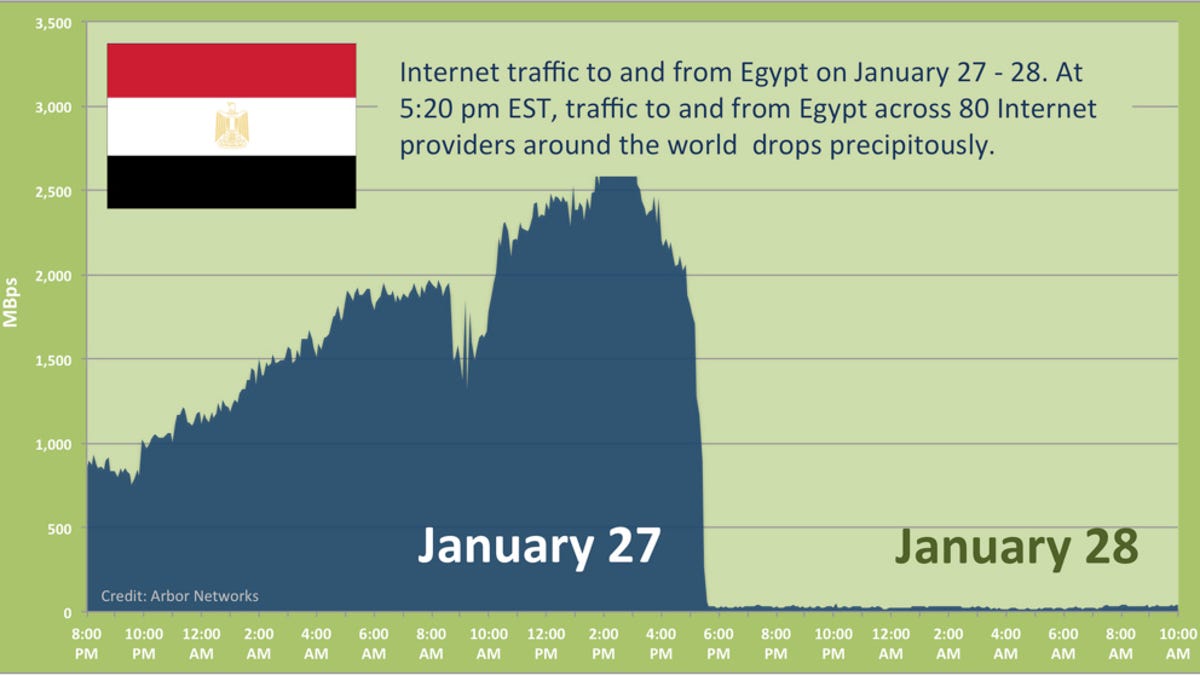Egypt's Internet disconnect reaches 24 hours
It was a full day ago that Egypt's network links to the rest of the world began to die, and a televised address from the country's president indicates that no end is in sight.
Egypt's unprecedented Internet disconnection has now lasted 24 hours without signs of ending.
At this time yesterday, one by one, the country's electronic links to the outside world fell silent. It started at 2:12 p.m. PT with the mostly state-owned Telecom Egypt disabling its networks, with four smaller network providers following suit between 2:13 p.m. PT and 2:25 p.m. PT.
Egyptian President Hosni Mubarak appeared on state television at approximately 2:15 p.m. PT today to announce that he would sack his cabinet but would not resign--an indication that no end to the disconnect was near. "I will not be lax or tolerant," he said, according to an Al Jazeera English translation. There's a fine line, he said, between permitting free speech and allowing chaos to spread.
Yesterday's network disconnection was followed soon after by mobile networks pulling the plug as well. Vodafone confirmed in a statement that "all mobile operators in Egypt have been instructed to suspend services in selected areas." So did Mobinil, the country's largest mobile provider. (See CNET's previous coverage.)
Those outages come as four days of clashes between security forces and tens of thousands of protesters continued on the streets of Cairo and other major cities, despite an official curfew in effect Friday evening. Tanks have taken up positions around some TV stations and foreign embassies, and Al Jazeera English is reporting that the end of three decades of autocratic rule by Mubarak may be nearing.
U.S. Secretary of State Hillary Clinton said in a speech earlier today that "we urge the Egyptian authorities to allow peaceful protests and to reverse the unprecedented steps it has taken to cut off communications."
"We think the government, as many of us have said throughout the day, need to turn the Internet and social-networking sites back on," White House press secretary Robert Gibbs said. He added: "Individual freedoms includes the freedom to access the Internet and the freedom to--to use social-networking sites."
Egypt's Internet connections aren't completely down: the Noor Group appears to be the only Internet provider in Egypt that's fully functioning. Cairo-based bloggers have speculated that its unique status grows out of its client list, which includes western firms including ExxonMobil, Toyota, Hyatt, Nestle, Fedex, Coca-Cola, and Pfizer, plus the Egyptian stock exchange.
An analysis posted by network analyst Andree Toonk, who runs a Web site devoted to monitoring networks, shows that before the outage, there were 2,903 Egyptian networks publicly accessible via the Internet. Today, there are only 327 networks.
A chart prepared by European networking organization RIPE provides a detailed glimpse at how Egypt's network went dark. Until yesterday afternoon, there was the normal noise of networks being added and deleted, followed by a sharp spike yesterday between 2 p.m. and 2:30 p.m. ET. There's been virtually no activity since.
Before yesterday's outage, Egyptian use of the Tor anonymizing network had experienced a dramatic spike that coincided with the beginning of widespread protests. Normal usage was hovering around 400 users a day, but leaped to more than 1,200 as of January 24. (Here's a different view.)
Contrary to some reports, however, there's no evidence that Syria's Internet connection is down. Compare this chart from an Egyptian provider showing the network going completely dark with this one from the government-owned Syrian Telecommunications Establishment that depicts normal activity.
The rumors about Syria originated a few hours ago when Al Arabiya news service said that "Syria suspends all Internet services," and followed up with a denial from the authorities. Reuters reported earlier this week that Syrian authorities have banned programs that allow access to Facebook Chat from cell phones.
There are some parallels. The now-defunct HotWired site, succeeded by Wired.com, reported in 1996 that "the U.S. government has quietly pulled the plug on Iran's Internet connection." During a state of emergency in Bangladesh in 2007, satellite providers were ordered to cease airing any news shows. And in Burma later that year, the country's ruling military junta pulled the plug on the nation's limited Internet access.
But Burma is not Egypt, a country of more than 80 million people equipped with tens of millions of computers and cell phones--who have now found themselves almost entirely disconnected from the rest of the world.
Egypt receives more than $1.3 billion annually from U.S. taxpayers in the form of military aid, according to the U.S. State Department.
"Thanks to the blanket communications shutdown, the protests today took place in an information vacuum," according to a dispatch from Index on Censorship's Egypt regional editor Ashraf Khalil in Cairo. "On Tuesday, even during the demonstration, everybody was checking Twitter both to coordinate and for news on what was happening across the country. This time nobody knew what was happening anywhere else--not even on the other side of the river in Tahrir Square."


